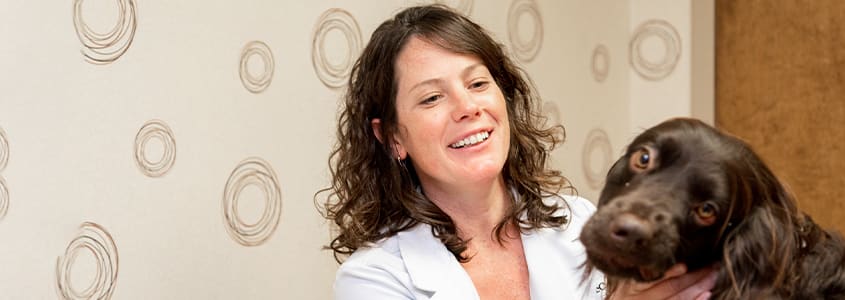What is IVDD in dogs?
Intervertebral disk disease (IVDD) in dogs can also be described as a ruptured, slipped, bulging or herniated disk. This condition is most commonly seen in beagles, dachshunds, Pekingese, Shih Tzus, basset hounds, or American cocker spaniels but may occur in dogs of any breed.
What causes IVDD to occur in dogs?
Intervertebral Disc Disease is an age-related, gradual degenerative process that affects the spinal cord of the dog over a period of time, often undetected. Even with yearly wellness exams, your vet may not detect any signs of IVDD until your dog's hardened disc or discs become ruptured and painful symptoms become evident. Something as every day as a jump up onto the sofa could damage a disc that has been weakened by IVDD, and trigger acute and painful symptoms of the disease.
IVDD occurs when the shock-absorbing discs between your dog's vertebrae gradually begin to harden until they are unable to cushion the vertebrae properly. The hardened discs will typically go on to bulge and compress the spinal cord, often damaging the dog's nerve impulses such as those that control bladder and bowel control. In other cases, a simple jump or poor landing can lead one or more of the hardened discs to burst and press into the nerves of the dog's spinal cord causing pain, possible nerve damage or even paralysis.
What are the symptoms of IVDD in dogs?
Intervertebral Disc Disease can occur in any of the discs in your dog's spine and symptoms of this condition will depend upon which part of the spine is affected, and how severe the damage is. Symptoms of IVDD may also appear suddenly or come on gradually. If your dog is displaying any of the following symptoms seek veterinary care as soon as possible. IVDD can be very painful for dogs and early treatment is essential for preventing the condition from becoming more severe or causing irreversible damage to your dog's spine.
Symptoms of Neck Intervertebral Disc Disease (Cervical IVDD)
Cervical IVDD occurs in the discs of the dog's neck. If you may notice one or more of the following symptoms, which can affect the whole body and range from mild to very severe contact your vet for immediate advice, or visit your closest animal emergency hospital for veterinary care:
- Head held low
- Arching back
- Shivering or crying
- Reluctance to move
- Unsteadiness in all 4 legs
- Inability to walk normally
- Knuckling of all 4 paws
- Inability to support own weight
- Inability to stand
- Inability to feel all 4 feet and legs
Symptoms of Back Intervertebral Disc Disease (Thoracolumbar IVDD)
Dogs with Thoracolumbar IVDD have a damaged disc causing issues in their back region and may display one or more of the following symptoms. Symptoms of Thoracolumbar IVDD mainly affect the mid to back portion of the dog's body and can range from mild to very severe:
- Muscle spasms
- Tense belly
- Weakness in hind legs
- Crossing back legs when walking
- Inability to walk normally
- Knuckling of back paws, or dragging rear legs
- Inability to support their own weight
- Unable to move or feel back legs
Symptoms of Lower-Back Intervertebral Disc Disease (Lumbosacral IVDD)
If your dog is suffering from lumbosacral IVDD the problematic disc or discs are located in your dog's lower back region. Symptoms of lumbosacral IVDD typically affect the very back of the dog's body and may range from mild to very severe:
- Pain and/or difficulty jumping
- Limp tail
- Urinary or fecal incontinence
- Dilated anus
How is IVDD diagnosed in dogs?
If your dog begins showing any of the above symptoms immediate veterinary care is required. Tests for diagnosing Intervertebral Disc Disease typically include standard x-rays, a neurological exam, and/or MRI to help locate the disc or discs causing your dog's symptoms.
What is the treatment for IVDD?
The diagnosis and treatment for Intervertebral Disc Disease need to begin as early as possible in order to achieve good treatment outcomes. That's why we recommend taking your dog to the vet for a full examination if you spot signs of IVDD in your dog. Delays in treatment could lead to irreversible damage.
Anti-Inflammatory Medications
Pet parents often wonder if their dog can recover from IVDD without surgery. If your dog is diagnosed early with a mild to moderate IVDD injury, your vet may try treatment with steroid and anti-inflammatory medications (to help reduce pain and swelling), combined with strict crate rest for approximately 4 -6 weeks.
Surgery
Surgery is typically recommended for dogs suffering from more severe cases of Intervertebral Disc Disease where rest and medication are not sufficient to reduce pain and other symptoms. During surgery, your dog's veterinary surgeon will remove the hardened disc material which is pressing on your dog's spinal cord and causing the IVDD symptoms.
Surgery outcomes are most successful in dogs that have not lost their ability to walk. If your dog's surgery is not successful in returning your pet to normal mobility, a dog wheelchair can help your pup to enjoy a happy and active life while living with Intervertebral Disc Disease.
Recovery from IVDD surgery requires 6 - 8 weeks of restricted activity. Running, climbing stairs, playing with other dogs, or jumping on furniture need to be prevented in order to avoid further damage as your dog's spine heals.
The cost of IVDD surgery varies greatly depending on a number of factors including where you live, but you can expect to pay anywhere from $1,500 to $4500. Your vet will provide you with an accurate estimate and breakdown of costs.
Physical Therapy
Following surgery, your vet may also recommend physical therapy for your dog in order to work on muscle strengthening and to help get your pet moving comfortably again.
Note: The advice provided in this post is intended for informational purposes and does not constitute medical advice regarding pets. For an accurate diagnosis of your pet's condition, please make an appointment with your vet.
Is your dog showing signs of IVDD? Contact our Greensboro vets right away to schedule an examination for your pup. Our vets have experience in the diagnosis and treatment of this potentially painful condition.
Looking for a vet in Greensboro?
We're always accepting new patients, so contact our veterinary hospital today to book your pet's first appointment.
Related Articles View All
What happens during a routine pet exam?
Routine wellness exams are a proactive way to help safeguard your pet's long-term health and vitality. Why should you take your healthy pet to the vet? What happens during a pet health wellness exam? Find out.
How much does an emergency vet visit cost?
Emergency veterinary care can be costly, but planning ahead allows you to make decisions about your pet's care based on their needs rather than financial restrictions. Today, we look at the cost of emergency vet care, and how to be ready if your pet needs emergency treatment.
Kidney Failure in Dogs
Chronic and acute kidney failure are serious health problems commonly seen in dogs. Here, you will learn about the differences between chronic and acute kidney failure in dogs, the signs to watch for and how these conditions are treated.
Signs of Bladder Infections in Dogs & How They Are Treated
Many dogs suffer from bladder infections and other issues affecting the urinary tract system. What causes bladder infection in dogs? What signs should you watch for? How do vets treat bladder infections in dogs? Read on to find out.


